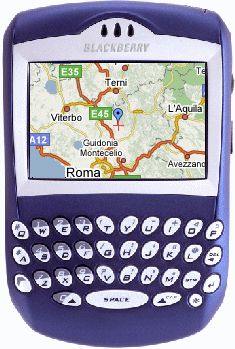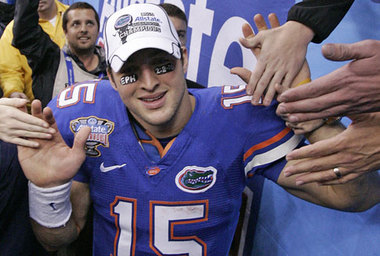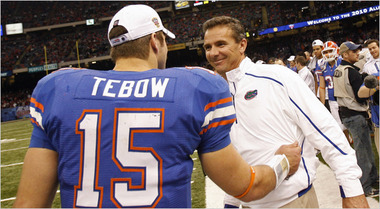Christmas Day, hours after midnight mass, my wife and I hopped a plane to Washington, to spend some time with our families. The flight went smoothly, and a couple hours later we found ourselves in the back seat of a car, headed to my sister-in-law’s in Virginia for dinner.
A light snow was falling. Siobhain’s father was driving, and he had a vague idea of how to get there. Siobhain’s mother, meanwhile, was reading the map – which turned out to be badly out of date. They tried in vain to find streets that didn’t exist on the map. Meantime, what had been a light snowfall turned into a drizzle of rain. After about 45 minutes, we were completely lost.
In the dark. On a strange back road. In the rain. In Virginia.
 I remembered then that I had my BlackBerry with me, and it had a GPS navigator. I’d never used it before but decided to give it a shot. After loading in the street address, the screen lit up with a map, showing where we were, and where we had to go. A friendly female voice dictated the directions to us. To our amazement, about 10 minutes later, we pulled into the driveway. We used the same thing to get home later that night.
I remembered then that I had my BlackBerry with me, and it had a GPS navigator. I’d never used it before but decided to give it a shot. After loading in the street address, the screen lit up with a map, showing where we were, and where we had to go. A friendly female voice dictated the directions to us. To our amazement, about 10 minutes later, we pulled into the driveway. We used the same thing to get home later that night.
It was our very own Christmas miracle.
And I couldn’t help but think of it as I re-read Matthew’s account of the magi – another group of travelers, on another Christmas, finding their way to a strange and unfamiliar place.
The story of the magi is one of the more mysterious in the New Testament. The gospel doesn’t tell us how many of them there were; one early Christian tradition actually told of 12 astronomers making their way to Judea, presumably paralleling the 12 tribes of Israel and, of course, the 12 apostles. But somehow – probably because of the number of gifts mentioned – the number over the centuries dwindled to three. Matthew’s gospel is the only one that even mentions them. We really don’t know much more about them, except that they were searching for Jesus.
As I told my wife the other day: their visit to Herod is the last time in recorded history that a group of men stopped somewhere to ask directions.
But there is something about their journey that is both poignant, and profound. Among other things, the travels of the magi teach us the value of trust. They trusted in power from above to pierce the night and point the way. Their story also tells us that even the wisest of men need help to find their way.
It’s significant, I think, that the magi traveled as a group – because no one makes a journey of faith alone. As a church, we are a community: a body of people looking out for one another, supporting one another. We are all traveling, somehow, in the same direction. And when we can, we also help one another to read the skies, and follow the way to the light.
So it was with the magi.
We call this feast “Epiphany,” the Greek word meaning “Manifestation.” On this feast, Christ is made manifest to the world, in a place many might never have expected. But our lives are made up of countless smaller epiphanies — discoveries that also defy expectations, and that can sometimes shed light on our world, just as the star shed its light on Bethlehem.
God is made manifest everywhere.
This time of year, His grace is revealed to us in the faces of our children…in the smiles of our grandparents…in the comfort of having those we love close to us.
And the epiphanies explode around us.
The epiphany of a family sharing a meal…a friend sharing a joke…a child sharing her fears or hopes or secrets. It’s there in the kindness of strangers, and the courage and quiet dignity of those struggling to find shelter, or work.
There is the epiphany of having someone take your hand and tell you that you are loved.
And there is the most wondrous epiphany of all: kneeling in this church and beholding a slender piece of bread containing our Creator, and our savior.
There is the epiphany of holding that — and holding Him — in the palm of your hand.
These are the stars that help to light our way.
Just before Christmas, I was chatting with the Korean woman who owns the dry cleaning place behind my apartment. I guess she noticed that I have a lot of shirts with crosses on them. And she mentioned to me, in her broken English, that she was going to become a Christian at Christmas. “I will be,” and she struggled to find the word, and motioned with her hand.
“Baptized?,” I said.
“Yes!,” she cried out. “Be baptized on Christmas!” She explained that she had grown up Hindu, but as a young girl was taught by missionaries. After coming to America, she joined an evangelical church in Queens.
I congratulated her and wished her well. I invited her to stop by our church sometime.
Like the magi, I think she is also a visitor from the East, on a journey.
But this feast should remind us: we are all magi, no matter where we come from. Each of us bears a gift, and has something to offer. And we are all journeying toward an unknown place of promise, guided by a never-ending light.
It’s not a BlackBerry. It’s not a GPS. It’s something much greater.
And that light assures us of this: if we follow it all the way, no matter how strange the road or unfamiliar the map…we will never be lost.

